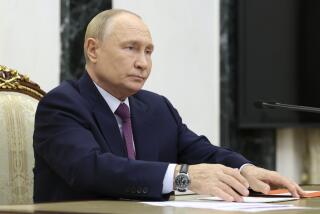Preemptive Raids on Nuclear Sites Rejected : Defense: Pentagon official clarifies policy against spread of arms. Old methods to be kept.
- Share via
WASHINGTON — The Clinton Administration’s new plan to counter the spread of nuclear arms to Third World countries does not include preemptive strikes at nuclear facilities, a top official said, countering suggestions by some policy-makers that such an option might exist.
Ashton B. Carter, assistant secretary of defense for international security policy, said that those who believe that Washington might bomb such facilities before the country involved used its nuclear weapons have “misunderstood” Washington’s intentions.
He also asserted that the Administration plan, unveiled last December, does not mean that Washington is abandoning traditional efforts to persuade such countries to give up their nuclear weapons.
At a briefing last December--and in charts and diagrams accompanying similar sessions--officials hinted that preemptive strikes were a possibility.
Carter also confirmed that the Pentagon is developing a way to verify the dismantling of U.S. and Russian nuclear warheads and is considering the possibility of proposing it to Moscow in coming discussions.
The plan would call for each side to dismantle its warheads privately--to protect their design secrets--then to place the fissionable materials in special containers that would enable the other side to measure the amount of plutonium removed. By measuring the extracted plutonium, monitors could determine how many warheads had been dismantled, Carter said.
He made his remarks as the Pentagon announced that Defense Secretary William J. Perry plans to travel to Russia, Ukraine, Kazakhstan and Belarus on Wednesday for a week of meetings with officials about dismantling nuclear weapons and transforming defense industries.
His visit will be the first by a top Clinton foreign policy-maker since the arrest of CIA officer Aldrich H. Ames on charges of selling secrets to Moscow. Although both sides have sought to play down the Ames affair, it has prompted calls in Congress for a halt to aid for Russia.
Carter’s remarks were intended to correct what officials conceded had become a widespread impression of the new “counter-proliferation” policy--that is, that the United States might preemptively bomb the arsenals of a potentially hostile emerging nuclear power.
Although the Administration has never threatened such action against any specific country, the idea of launching a preemptive strike--a reversal of previous U.S. policy--had drawn criticism among some Third World governments.
Carter made clear Friday that he was speaking only in general terms and was not referring to North Korea. Although Pyongyang often has been mentioned as a major threat among emerging nuclear powers, Carter avoided discussing the North Korean question.
But, ironically, U.S. officials conceded that it had been Pentagon policy-makers who appeared responsible for most of the impression that the Administration might launch preemptive strikes against nuclear targets.
A senior defense official left just such an impression at a background briefing for reporters in December. And charts used in earlier briefings by Carter have cited “destroying weapons-of-mass-destruction capabilities in peacetime deployment” as an element of the plan.
At the same time, then-Defense Secretary Les Aspin talked often about the need for a policy to contend with the kind of problem faced in the 1991 Persian Gulf War, when U.S. bombers were unable to destroy the nuclear warfare facilities of Iraqi leader Saddam Hussein.
More to Read
Sign up for Essential California
The most important California stories and recommendations in your inbox every morning.
You may occasionally receive promotional content from the Los Angeles Times.













